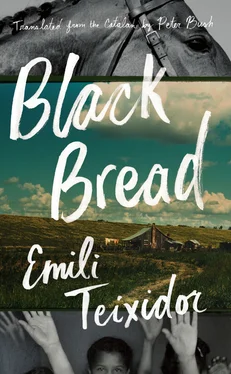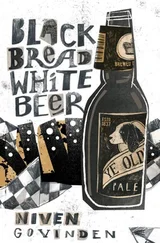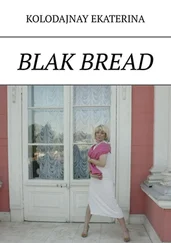“What did you say your name was, Brother?” asked Dad Quirze.
“Xavier,” replied the novice respectfully.
“Is that your real name or the one they gave you when you entered the monastery?”
“ De veritat …” the young man spoke Catalan with a clipped northern Spanish accent.
“You’re from up north, right? Nearly all the friars that join Saint Camillus are northeners. Most are Navarrese, like the Superior.”
“Yes, from Tudela, but I lived in Barcelona for a while…”
“How long you got left on the ranch before you finish your studies?” Dad Quirze pursued what seemed like an interrogation.
“Five…”
Dad Quirze pursed his lips as if to whistle. “Crikey!” he exclaimed, “how do you manage the business of living without a family, like a rooster without a coop to bed down in? You know what I mean…”
The novice turned as red as a hot coal and didn’t know what to say. His Superior spoke on his behalf and rescued him from his quandary: “We religious folk comprise a family that is as numerous, if not more, than yours, and much larger than most families living in towns and cities. Our family is the whole community, all our brothers and, beyond that, all the faithful in the big family of Christianity.”
Dad Quirze’s face went bright red and his eyes sparked. He winked at Father Tafalla and continued tongue-in-cheek: “Family, family… Let’s be straight about this. A family of men doesn’t serve the same ends as a family of couples, of men and women… Is that clear enough?”
“There are many families… and within families, there are families and families…”
“I’d prefer to say that there are couples and couples…” Dad Quirze was unrelenting and his obstinacy dismayed everyone; we’d never known him to be so vociferous. “Every family is more or less the same, but every couple is different, has different problems…”
Aunt Enriqueta, who’d ground to a halt by one of the corner cupboards, holding a tray of nut and dried fruit desserts, chipped in to break the logjam: “Everyone has a right to his opinion and they’re all good,” her voice sounded strained, as if she was reluctant to intervene or was upset by the subject they were broaching. “They have their problems in the monastery, as we all do.”
Dad Quirze was shut up by his sister-in-law’s remarks. After a moment’s silence, when he’d looked Aunt Enriqueta up and down, as if thinking through his response, he began sarcastically: “And what do you know about these things?”
“I know as much as the next…” Now it was Aunt Enriqueta’s turn to blush a bright red, while she looked round and opened the corner cupboard door to take out another dish.
“Woe betide the man whose only knowledge is what he’s been taught!” Dad Quirze laughed slyly. “That’s what you always reckon, don’t you, Grandmother?”
Grandmother nodded anxiously, immediately made an effort to get up, and then said, giving the conversation another twist: “Why don’t we eat our desserts and drink our coffee in the gallery? There’s a delicious sun that’s not reached here yet. And while we’re about it, we can take photos for the goblins.”
Grandmother’s suggestion threw everything into the air. All those eating jumped to their feet; we were the first to do so to help the old lady extricate herself from her end of the table, and everybody gradually went into the nearby gallery commenting: “Now that’s a real brainwave! A First Communion photo without a photographer!”
“We could have arranged one!” said Bernat. “This only happens once in a blue moon.”
“Stuff and nonsense!” growled Dad Quirze. “What’s the point of a photograph at her age when her body hasn’t yet grown and filled out, when she’s still got to grow into a proper woman? It would be like photographing a silk worm before it’s changed into a moth.”
“But it’s a memento…” retorted Aunt Enriqueta who’d started spreading the cloth on the long table in the gallery and setting out the dessert dishes and plates. “When the years have gone by, we all love to see what we looked like when we were little.”
Father Tafalla put his arm on Dad Quirze’s shoulder, as they sat down together, asking: “How’s business going? When will Grandfather Hand be bringing down his flock?”
Dad Quirze settled himself and answered cautiously: “More of the same…we can discuss that later.”
Quirze, Cry-Baby and I were the ones who were most excited. We asked: “What should we do, Grandmother?”
“How do you want us to stand?”
“Is it true the goblins can see us?”
“Will we be able to see the photo later?”
Grandmother laughed mischievously. She seemed to be getting more fun from her game than we were.
“Go into the middle of the sitting room. You must stand in the middle, facing the French windows, veer slightly to the left, next to the lumber room, so the light falls on your faces.”
While the grownups sat down around the table, we three stood in the rectangle of sun coming through the door between the sitting room and the gallery. Cry-Baby clutched her rosary and missal and stood between Quirze and me. Grandmother sat on the trunk that was squeezed behind the door, an old portmanteau, and directed operations with a stick. Ció and Mother came upstairs and watched from the landing, laughing and digging their elbows in their sides as if these fun and games were a little light relief from their chores. Aunt Enriqueta poured sweet wine into the glasses and smiled cheerfully.
“First the three of you and then Núria by herself,” said Grandmother.
We three cousins grinned, held our breath and stood still and silent for a moment like statues, our eyes staring at the luminous rectangle of the door.
“Click!” shouted Grandmother, who was also grinning and knocking the trunk lid with her fist.
“One more! One more!” we shouted, jumping and breaking up the group.
So we stood in three or four different poses until Grandmother said enough was enough.
“Now Núria by herself!” insisted Grandmother, with great determination as if she believed in her game even more than we did.
Quirze and I moved reluctantly aside and observed Cry-Baby as she was left alone, white and almost transparent in the centre of the sunspot.
Ció and my mother applauded from their vantage-point, and as they returned to the kitchen, they said: “You all looked wonderful! You were a real picture together!”
“Especially Núria looking like a bride.”
“Every corner of the house will remember you looking so smart. These walls were so proud to see you so pretty.”
“Especially Núria, we’ll always remember her lovely like today.”
Aunt Enriqueta was also laughing in the gallery.
“Where were the goblins watching from?” we chorused. “Do they have a magic camera that can take pictures without light, at any time, even at night?”
“They’re all around us,” answered Grandmother. “They see everything and hear everything. Especially at night, of course. They move around most at night-time.”
“So why can’t we see the photos they take?”
“Because if you’d wanted that kind of photo, we’d have contracted the local photographer, or the one from the Estudi Nadar or Casa Napoleón in Vic,” continued Grandmother as if it were the most natural thing in the world to say. “These are special photos only we can take here. Professionals only catch what our eyes can see; goblins, on the other hand, din these happy moments into our brains, the whole group around us, when everyone’s full of it, the laughter, the sunlight, and the scents of basil, rosemary and azalea and allow us to remember them forever. These photos will never fade.”
Читать дальше












